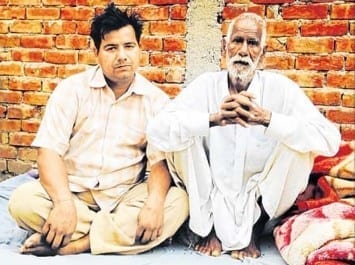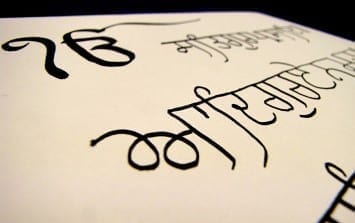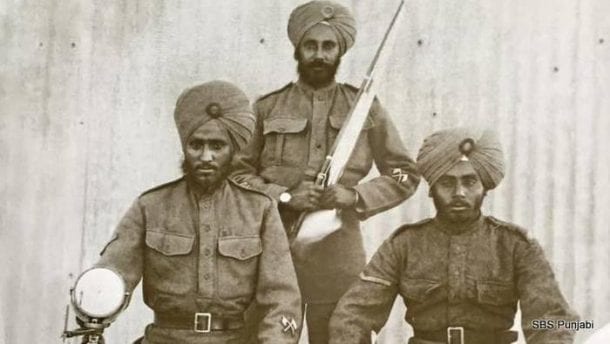
ਸੁਨਿਆਰੁ (suniaar)
Meaning: noun: Goldsmith.
Quote:
ਜਤੁ ਪਾਹਾਰਾ ਧੀਰਜੁ ਸੁਨਿਆਰੁ॥
jat paahaaraa dheeraj suniaar.
Let pure conduct be the furnace, and patience the goldsmith. – Guru Nanak Sahib, Guru Granth Sahib, Page 08
Message: The last pauri of Jap Ji Sahib mentions a spiritual mint. A mint is the place where the coins of a country are manufactured. With the help of a furnace, anvil, hammer, fire, bellows and the crucible, the goldsmith crafts coins from a metal, which become approved after they are stamped with the royal seal on them. Using this analogy, the method of moulding the human mind in the spiritual mint is described here. The required tools for this spiritual moulding are as follows:
| Tools used in the worldly mint | Tools used in the spiritual mint |
|---|---|
| Furnace | Pure conduct |
| Goldsmith | Patience |
| Anvil | Intellect |
| Hammer | Guru’s wisdom |
| Bellows | Divine awareness |
| Fire | Hard work |
| Crucible | Love |
| Required chemicals, borax etc. | God’s Name |
| Metal | Mind |
A goldsmith has a furnace kept to a controlled temperature, the bellows operated with great skill to feed the fire, the anvil on which the metal is laid and hammered into shape, and the crucible to hold the metal for melting in the furnace and to pour it into the mould for the final casting. Likewise, Guru Nanak says, on one’s journey to union with the Divine, we need the corresponding tools. These are pure conduct, control over the senses of lust, anger, greed, attachment, and pride; patience and tolerance; intellect to absorb knowledge; diligence and hard work; and love and devotion. Thus, with these tools, the mind is made pure and exquisitely beautiful, just as a metal in the skillful hands of the goldsmith is minted into genuine coins.
Keen to Explore Further:
Stanza 38 can be looked at as the message of Jap Ji Sahib in a nutshell. Using the goldsmith and his workshop as an analogy for the human mind, it describes the qualities needed to attain spiritual union with the Divine.
This central teaching has been amplified and explained by succeeding Gurus in no uncertain terms. It is only from this existential fulcrum that a truly fulfilling, purpose-driven life is possible.
The fact is that we too often tend to lose sight of this central message and get side-tracked, which serves only to exacerbate the underlying problem.
While we justifiably pride ourselves in worldly knowledge acquired through education and skills, the knowledge being talked about here is the knowledge of the self, without which all else is to no avail. Instead, Guru Nanak points to the cultivation of inner virtues.
In this stanza, Guru Nanak lays out the process. Once again, he points to the cultivation of inner qualities. This is, indeed, the process of becoming a truly cultured and integrated personality, a necessary condition for a successful life.
What is the process? What should we carry in our toolbox?
First, is the cultivation of pure conduct (jat), by restraint or a reining in of the senses. Put another way, this implies shifting the focus of one’s faculties in the proper direction. Guru Amar Das has very beautifully illustrated the right orientation for our senses in Anand Sahib: for instance, eyesight must be accompanied by the insight of seeing the same spark in all sentient beings; hearing must learn to filter out unnecessary noise and listen to Truth; the tongue must avoid gluttony and so on.
Patience (dheeraj) is a necessary pre-requisite to the restraint of the senses and acts as a check to impulsive and addictive tendencies, and teaching us how to defer immediate gratification.
Patience and restraint must be accompanied by discernment (mat) and knowledge (ved). In Gurbani’s idiom, the mind must develop this sense of discernment and/or discrimination (bibek) for what hukam has in store for us. This is made possible by conditioning the mind with the teachings of Gurbani.
The inner fire (tap) is ignited by the bellows of divine awe and awareness (bhau). The point to be noted here is that tap is generally associated with the fire of austerities; in Sikhi, the austerities are primarily two: walking in accordance with hukam and service as a social concern.
Finally, one has to nourish love and devotion with an intensity that burns up internal impurities, thereby purifying the mind and paving the way to receive divine beneficence. It is through this beneficence that one embarks on this endeavour in the first place, and achieves union with the Divine.
An authentic Sikh life can thus be likened to a lifelong alchemic process of apprenticeship to Gurbani where psychological lead (manmukh) is cast in the mold of love to become spiritual gold (gurmukh).
A gurmukh walks in accordance with hukam and serves society selflessly.
Notes: An anvil is a block with a hard surface on which another object is struck. A bellows is a device for delivering pressurized air in a controlled quantity to a controlled location. A crucible is a container which is used for metal, glass, and pigment production.
Etymology: From Sanskrit suvarṇakaar (goldsmith) → Pali suvarṇṇakaar → Prakrit suvaṇṇaar/suṇṇaar → Shina (Dardic) suniaar. Comparable to modern Punjabi suniaaraa.







 To understand how this mistake happened, read the apologies from
To understand how this mistake happened, read the apologies from 










